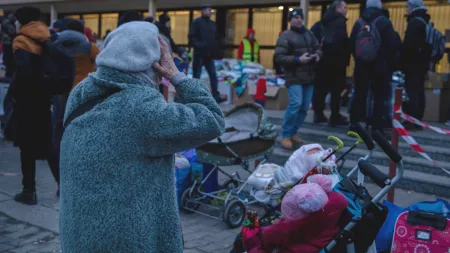As the war in Ukraine enters its third week this Thursday, the humanitarian organization CARE International is deeply worried about the protection of civilians caught in the crosslines. "Over the past two weeks, there have been numerous reports of impacts on civilian infrastructure, most recently even on a maternity and pediatric hospital," says CARE’s humanitarian advocacy coordinator Delphine Pinault. "Bombs on hospitals that house expecting mothers, new-born babies and children at their most vulnerable, are an unacceptable breach of International Humanitarian Law and Human Rights Law."
Since the beginning of the war, the World Health Organization has confirmed at least 18 incidences of severe impacts on medical facilities in Ukraine, with fatal consequences in some instances and devastating damages to the infrastructure and equipment. CARE strongly calls on conflict parties to minimize the effects of the war on civilians by respecting the principles of humanity, necessity, proportionality and distinction, the corner stones of IHL.
"Civilians, and especially women, pregnant women and those with new-born and small children bear the brunt of this horrifying escalation of violence," notes Pinault. "We know from other conflicts such as Syria and Yemen that the specific needs of women, girls and children are far too often unmet in war times: pre- and postnatal care, safe delivery facilities, protection from abuse, exploitation and violence as well as safe shelters and adequate nutrition should be a priority for this humanitarian response." Ukraine also has a large population of elderly and disabled women who face even greater risks.
"Civilians always pay the highest price. This escalating violence – which is resulting in civilian deaths, including children – is totally unacceptable. The protection of civilians, including their safe passage to voluntarily leave Ukraine in whatever direction they choose must be priority number one," says CARE’s Delphine Pinault.
The road to safety is particularly dangerous for women travelling alone with their children, as men have to stay behind. 25-year-old Eugenie made the trip of 28 hours to reach neighbouring Romania with her 11-month-old baby Mikhael and 5-year-old Sofia. "It was very scary on the road. We saw 8 missiles coming overhead at one point. My husband drove us to the border, to safety, and then he turned around and went back. I am so scared for him."
About CARE: Founded in 1945, CARE is a leading humanitarian organization fighting global poverty. CARE has more than seven decades of experience helping people prepare for disasters, providing lifesaving assistance when a crisis hits, and helping communities recover after the emergency has passed. CARE places special focus on women and children, who are often disproportionately affected by disasters. To learn more, visit www.care-international.org
As part of the Ukraine response, CARE International is currently partnering with People in Need, one of the largest non-governmental organisations in Eastern Europe and has provided humanitarian aid in the affected regions of Ukraine since the beginning of the conflict in 2014. CARE is also working with its long-term partner of 20 years SERA - a child protection focused organization - in Romania to deliver assistance to those fleeing into Romania from Ukraine.
